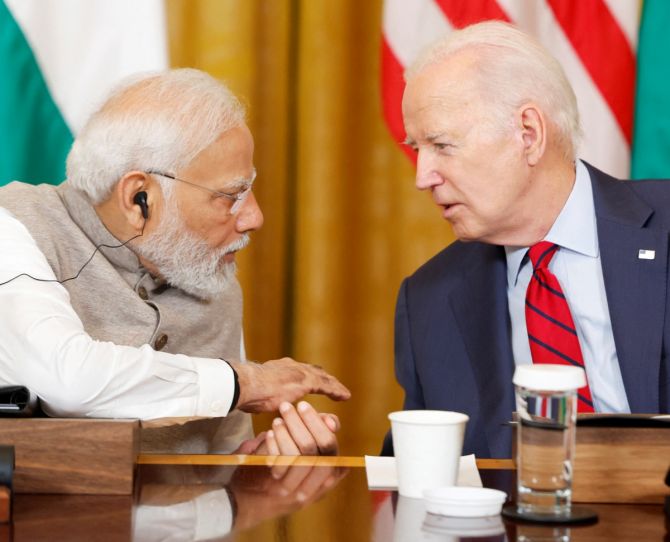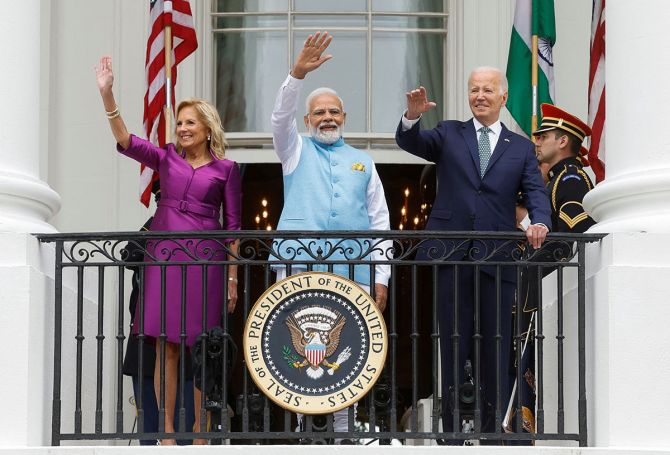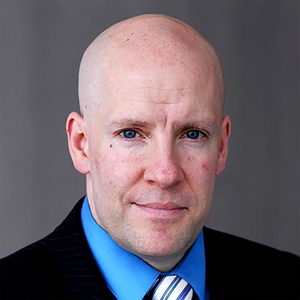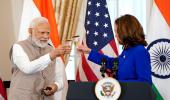'Every type of deal that US government officials were privately indicating 'hope' to have included a few months back made it in.'

Richard M Rossow is the chair in US-India Policy Studies at the Center for Strategic and International Studies, a think-tank in Washington, DC. He has devoted 16 years to nurturing, helping build and reinforcing the partnership between the US and India.
Before CSIS, he led the tasks his firm, McLarty Associates, undertook for clients in India. McLarty Associates was set up by Thomas F 'Mack' McLarty, one of Bill Clinton's oldest friends from Arkansas, who also served as the then president's chief of staff.
Rossow was also the deputy director of the advocacy group, the US-India Business Council, for a fruitful decade from 1998 to 2008.
"Our strategic and commercial interests overlap sufficiently to unlock big things," Roussow tells Vaihayasi P Daniel/Rediff.com about the Modi-Biden Summit.
- Before The Summit: 'Trust can only be earned over long periods of time'
How successful do you feel was the visit?
The visit achieved substantial outcomes on multiple fronts.
In terms of our defense relations, we announced new agreements to improve inter-operability and military cooperation, specific weapons sales, and -- perhaps most importantly -- to cooperate in developing new defense articles.
There were numerous agreements related to our shared interest in cooperating on strategic technologies, from semiconductors to quantum computing and artificial intelligence.
And third, there were concrete announcements to improve people-to-people ties such as the expansion of consulates on both sides and a relaxing in US visa renewal requirements.
The agreement for each side to drop a range of disputes in the World Trade Organization was 'icing on the cake'.
What came about that was expected and what did not?
The announcements on defense cooperation and strategic commercial cooperation were largely expected.
But the announcements on concluding commercial disputes and expanding our consulates was fairly surprising.
Frankly, every type of deal that US government officials were privately indicating 'hope' to have included a few months back made it in.

Even some late additions like India's decision to join the Artemis Accords on the peaceful exploration of space.

The highs and lows? Most impressive moment from the American point of view?
It is hard to note a low point. The visit, on most any front, exceeded the lofty expectations set ahead of time.
The most disappointing part was, perhaps, the rainy weather, which made some of the public events a bit soggy to attend.
The high point, to me, was resolving the range of WTO disputes I noted earlier.
Commercial policy talks have not yielded much progress in recent years.
The two nations have not shown much vision for our future commercial relationship, beyond strategic commercial links. Perhaps this is the start of something larger.

IMAGE: Richard M Rossow, Chair, Center for Strategic and International Studies.
Photograph: Courtesy Richard M Rossow
It was quite a huggy few days, quite like other visits?
There were moments with personal touches.
Vice President Kamala Harris offered particularly touching remarks on June 23 about her own visits to India as a young girl, and the long walks along the beaches in Madras. But there was also a great deal of business.
How good a bond did Biden and Modi forge personally?
It is easy to over-state the type of 'bonding' leaders forge.
I do not envision them taking vacations together post-retirement. But our strategic and commercial interests overlap sufficiently to unlock big things.
Our two economies with be key drivers of global growth in coming years.
We are two of the world's great military powers.
These summits, and the smaller engagements in-between, offer consistent opportunities to find meaningful ways to fulfill this promise.
Feature Presentation: Rajesh Alva/Rediff.com










